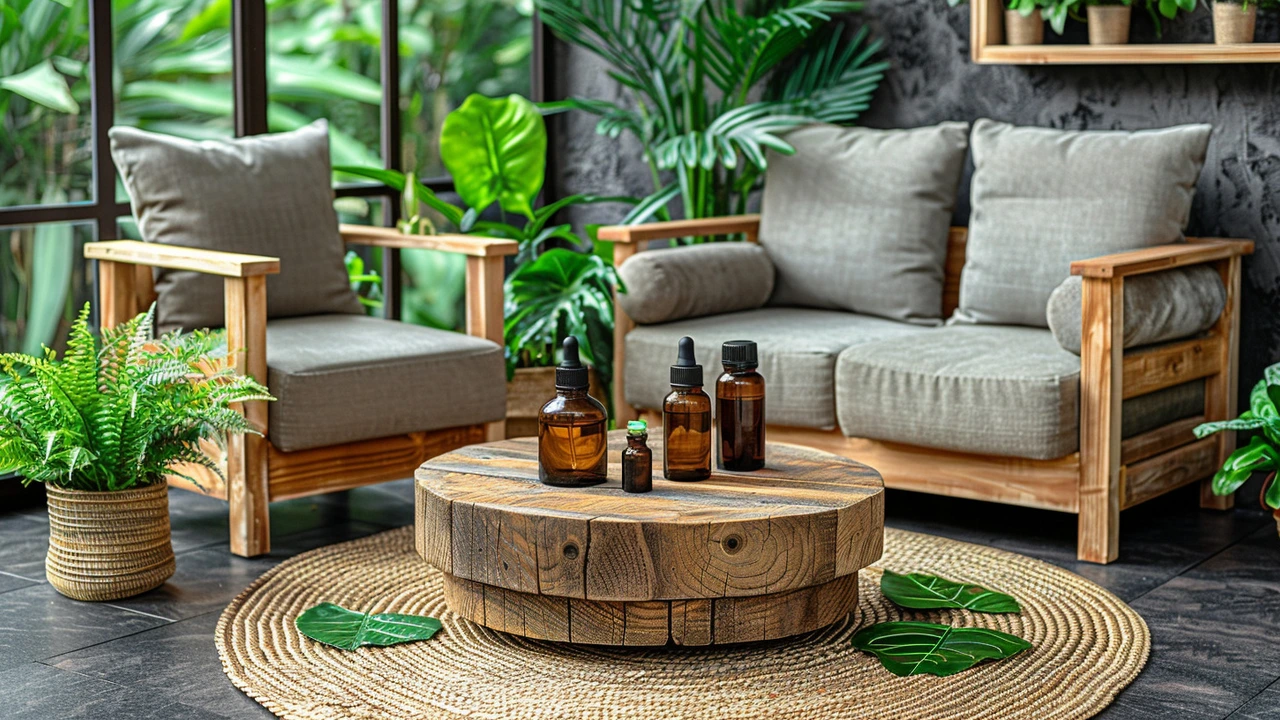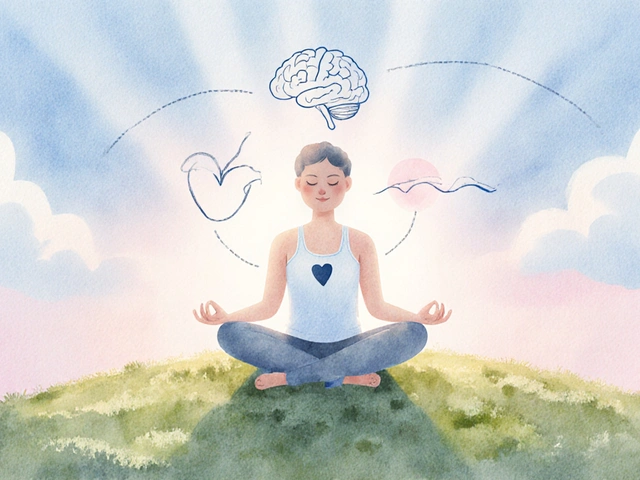
Meditation, an ancient practice rooted in mindfulness, gains a transformative touch with the inclusion of aromatherapy. The gentle embrace of essential oils can significantly enhance your meditation by promoting relaxation, focus, and emotional well-being.
The benefits of merging these two practices are manifold, offering a natural pathway to mental clarity and tranquility.
- The Benefits of Aromatherapy
- Choosing the Right Essential Oils
- Methods for Using Essential Oils in Meditation
- Creating a Calming Environment
The Benefits of Aromatherapy
Aromatherapy, a holistic healing treatment, uses natural plant extracts, particularly essential oils, to promote health and well-being. Incorporating aromatherapy into your meditation routine can create a symbiotic relationship, enhancing the overall experience by calming the mind and soothing the senses.
One of the primary benefits of aromatherapy is its ability to reduce stress and anxiety. Essential oils such as lavender, chamomile, and rose have been shown to lower cortisol levels, which is the hormone responsible for stress. This calming effect can create a more supportive environment for meditation, helping individuals enter a state of tranquility more swiftly and effectively.
Moreover, aromatherapy can significantly enhance mental clarity and concentration. Scents like rosemary and peppermint are known to stimulate the mind and improve cognitive function. Using these oils during meditation can sharpen focus, making it easier to maintain attention on the breath or a mantra without becoming distracted. This heightened focus can amplify the benefits of meditation, leading to deeper introspection and mindfulness.
According to the National Association for Holistic Aromatherapy, "The inhalation of essential oils can stimulate areas of your brain that influence physical, emotional, and mental health."
Another noteworthy benefit is the improvement in sleep quality. A restful night's sleep is often elusive for many, but incorporating soothing essential oils like lavender or sandalwood in your evening meditation routine can promote relaxation and ease, leading to better sleep. As sleep quality improves, so does the overall effectiveness of meditation practices, creating a cycle of wellness and rejuvenation.
Physical benefits also abound when integrating aromatherapy with meditation. Essential oils such as eucalyptus and tea tree can help alleviate respiratory issues, ensuring that your breathing remains steady and unimpeded during meditation sessions. Deep, restorative breathing is a cornerstone of effective meditation, and clear airways can make a substantial difference.
Emotionally, aromatherapy can be incredibly uplifting. Citrus oils like orange and lemon have energizing properties that can elevate mood and dispel feelings of lethargy or sadness. Incorporating these scents into morning meditation routines can set a positive tone for the day ahead, cultivating a sense of optimism and enthusiasm.
Finally, the act of selecting and using essential oils in itself can become a meditative ritual. The process of choosing oils based on their properties and personal preferences can encourage mindfulness and intention. This ritual can serve as a grounding practice, helping to anchor the mind before starting the meditation.
As you can see, the benefits of aromatherapy extend far beyond simple fragrance. By mindfully integrating essential oils into your meditation practice, you can create a deeply enriching experience that supports mental, emotional, and physical well-being.

Choosing the Right Essential Oils
When it comes to selecting essential oils for meditation, understanding the properties of each oil can help optimize your practice. Not every essential oil is created equal, and each has its own unique benefits. Lavender, for example, is well-known for its calming properties. This oil can help reduce stress and create a peaceful atmosphere, making it ideal for meditation sessions that focus on relaxation.
Another popular option is frankincense. Used for centuries in religious and spiritual ceremonies, frankincense has grounding properties that can aid in enhancing concentration and promoting a sense of inner peace. A few drops of frankincense oil can help quiet a restless mind, allowing for deeper meditation.
For those looking to elevate their mood and energy levels, citrus oils like bergamot or lemon can be quite effective. These oils are known for their uplifting properties and can help invigorate your senses, making them perfect for morning meditation sessions or practices aimed at boosting positivity and focus.
According to holistic health practitioner Sarah Adams, "Incorporating essential oils into your meditation can create a multi-sensory experience that not only enhances your practice but also supports overall well-being."
When choosing essential oils, it’s essential to consider the quality of the oil. Pure, high-quality oils are more potent and deliver better results compared to synthetic or diluted versions. Look for oils labeled as 'therapeutic grade' to ensure you’re using the best possible products for your meditation.
Rosemary oil is another excellent choice. Known for its ability to boost memory and mental clarity, rosemary can be particularly beneficial for meditative practices that involve visualization or complex visualization techniques. It can also enhance focus, making it easier to maintain a steady, uninterrupted meditation session.
If you're new to aromatherapy, starting with a blend of different oils can be beneficial. Blends are specifically formulated to target various emotional and mental states, offering a balanced and harmonious experience. Common blends for meditation include combinations like lavender and frankincense or bergamot and sandalwood, each providing a unique set of benefits that work well together.
In summary, selecting the right essential oils for your meditation practice involves a balance of understanding the properties of the oils and choosing high-quality products. Experimenting with different oils can help you find the perfect combination that enhances your personal meditation routine, providing a richer, more immersive experience.

Methods for Using Essential Oils in Meditation
Integrating essential oils into your meditation practice can be quite simple and incredibly effective. The methods you choose can vary based on personal preference and what you find most beneficial for your practice. Some techniques for using essential oils in meditation are time-tested and widely recommended.
One of the most straightforward methods is using a diffuser. These devices disperse essential oils into the air, creating a serene and aromatic environment. Opt for a diffuser with a timer to ensure a steady release throughout your meditation. Popular oils for diffusion include lavender for relaxation, eucalyptus for clarity, and frankincense for grounding.
Direct Inhalation
Another powerful method is direct inhalation. Simply place a drop of your preferred essential oil onto your palms, rub them together, and cup them over your nose. Take deep, slow breaths, allowing the aroma to transport you into a meditative state. This approach works well with oils like peppermint, which can sharpen focus, and orange, which can uplift your mood.
Topical Application
Topical application is also quite popular. Dilute essential oils with a carrier oil such as jojoba or almond oil before applying to your skin. Massage the blend onto pulse points like your wrists, behind your ears, or on the temples. This method offers a direct connection to the senses and can create a soothing ritual before beginning your meditation. Remember to do a patch test first to avoid potential skin reactions.
Meditation Jewelry
Meditation jewelry, such as mala beads or diffuser bracelets, can also be infused with essential oils. Add a drop of oil to the beads and let them absorb the essence. As you meditate, the subtle fragrance can help maintain your focus and keep you grounded. Rosewood beads, for instance, pair beautifully with sandalwood oil to enhance spiritual growth.
Aromatherapy Spray
An aromatherapy spray is another option. Mix a few drops of your chosen essential oils with distilled water in a spray bottle. You can mist your meditation space or even lightly spray your yoga mat before starting your practice. This not only refreshes the room but also envelops you in the scent, reinforcing your intention for the session.
Hot Towel Compress
A hot towel compress can add a nurturing element to your practice. Add a few drops of essential oil to hot water, soak a towel in it, and then place it over your face or neck. This technique can be especially comforting during restorative or yin meditation sessions. Lavender and chamomile oils work wonders with this method, providing deep relaxation.
These simple yet effective methods can transform your meditative experience by introducing the power of aromatherapy. As Thích Nhất Hạnh, a renowned Zen master, once said, "To meditate means to go home to yourself." Essential oils can be a guide on that journey, offering a fragrant path to inner peace and mindfulness.

Creating a Calming Environment
When it comes to meditation, your surroundings play a pivotal role in how effectively you can relax and focus. Creating a calming environment can significantly enhance your meditation practice. First, consider decluttering the space you intend to use. A clean, organized area can immediately set a serene tone, helping you to feel grounded and at peace. Make sure to remove any unnecessary items that might cause distraction, and keep only those that contribute to tranquility.
Lighting is another crucial aspect. Natural light works best, but if that's not an option, opt for soft, dim lights to create a warm and inviting atmosphere. Harsh lighting can be jarring and counterproductive to achieving a meditative state. Candles are an excellent addition here; not only do they provide gentle illumination, but they can also serve as an aromatic element when imbued with essential oils.
Setting the right temperature is equally important. A room that is too hot or too cold can be uncomfortable and pull your attention away from your meditation. Aim for a moderate temperature that supports your body in feeling relaxed without any need for adjustment. A cozy blanket or a cushion might be a wonderful addition to your setup, providing both comfort and a touch of personal coziness.
In addition to these physical elements, consider the role of sound in your meditation space. While some people prefer complete silence, others find that gentle background music or nature sounds, such as flowing water or birdsong, help to deepen their focus. There are numerous playlists available specifically designed to aid meditation, featuring calming, repetitive melodies that can help anchor your mind during your practice.
The scent plays a paramount role in setting the mood. Essential oils like lavender, chamomile, and sandalwood are excellent choices for creating a calming environment. You can use a diffuser to fill the room with these aromas, or apply a few drops to a cotton ball or tissue placed nearby. The soothing smell not only contributes to relaxation but also helps anchor your mind, making it easier to keep distractions at bay.
"The environment where you meditate can either support or impede your practice. Making thoughtful choices about your space can unlock deeper levels of focus and tranquility," says Dr. Sarah Brewer, a holistic therapist.
Lastly, personalize your space with objects that hold significance for you. This could be anything from spiritual symbols to photographs or mementos that evoke happiness and peace. Personalizing your meditation area makes it feel more like a sanctuary, which can be incredibly supportive for your practice.
By taking these steps to create a calming environment, you set yourself up for a more effective and pleasurable meditation experience. Each time you sit to meditate, your carefully crafted space welcomes you back, making it easier to slip into a state of peaceful mindfulness.





